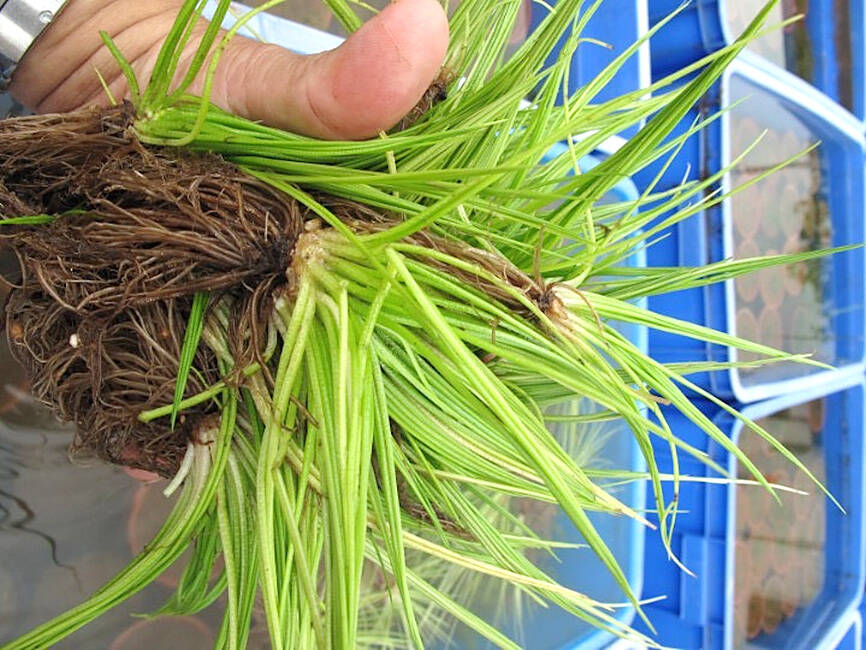Researchers have learned to propagate Taiwanese quillwort, a rare semiaquatic herb that is only found near Menghuan Lake (夢幻湖) on Taipei’s Yangmingshan (陽明山) and which is under threat of extinction.
The endemic plant species (Isoetes taiwanensis), which was discovered in 1971, is only found within an area of less than 0.5 hectares around the lake, Taiwan Forestry Research Institute researcher Huang Yao-mou (黃曜謀) said.
Although it grows in a humid subtropical climate zone, the plant faces threats from drought and competition from other species, which almost led to its extinction in 2006, he said.

Photo courtesy of the Taiwan Forestry Research Institute via CNA
To preserve the species, Huang said he observed the plant for three to five years, during which he found that it released spores in the soil that survive the winter before germinating in the spring.
Cold winter temperatures help activate the spores, with some germinating the following year and others taking up to 30 years, he said.
He experimented by placing soil samples with Taiwan quillwort spores in a refrigerator at 4°C, removing some of the samples every two weeks.
He found that while the plant’s megaspores normally took an average of 12 weeks to germinate, exposure to sustained cold temperatures could reduce that time to as little as two weeks.
Sixty-three percent of the spores germinated after 20 weeks stored at low temperatures, compared with only 26.5 percent in normal conditions, he said.
More specimens also made it to later stages in the plant’s life cycle, allowing them to be used for educational or research purposes, and assisting in conservation efforts, Huang said.
Taiwan quillworts are the first plants in the genus Isoetes to have their genome sequenced, which is useful in studying the special type of photosynthesis — crassulacean acid metabolism photosynthesis — used by them and some terrestrial plants, he said.
As Isoetes in neighboring countries such as China, Japan and South Korea are almost all hybrids of Taiwanese quillworts, the genome data also helps scientists better understand how it evolved, he said.
Huang and his research team published the results of their study on the effects of cold on Taiwan quillwort spore germination in the twice-yearly Indian Fern Journal in December last year.

Taiwan is to have nine extended holidays next year, led by a nine-day Lunar New Year break, the Cabinet announced yesterday. The nine-day Lunar New Year holiday next year matches the length of this year’s holiday, which featured six extended holidays. The increase in extended holidays is due to the Act on the Implementation of Commemorative and Festival Holidays (紀念日及節日實施條例), which was passed early last month with support from the opposition Chinese Nationalist Party (KMT) and Taiwan People’s Party. Under the new act, the day before Lunar New Year’s Eve is also a national holiday, and Labor Day would no longer be limited

COMMITMENTS: The company had a relatively low renewable ratio at 56 percent and did not have any goal to achieve 100 percent renewable energy, the report said Pegatron Corp ranked the lowest among five major final assembly suppliers in progressing toward Apple Inc’s commitment to be 100 percent carbon neutral by 2030, a Greenpeace East Asia report said yesterday. While Apple has set the goal of using 100 percent renewable energy across its entire business, supply chain and product lifecycle by 2030, carbon emissions from electronics manufacturing are rising globally due to increased energy consumption, it said. Given that carbon emissions from its supply chain accounted for more than half of its total emissions last year, Greenpeace East Asia evaluated the green transition performance of Apple’s five largest final

Taiwan is to extend its visa-waiver program for Philippine passport holders for another year, starting on Aug. 1, Minister of Foreign Affairs Lin Chia-lung (林佳龍) said on Friday. Lin made the announcement during a reception in Taipei marking the 127th anniversary of Philippine independence and the 50th anniversary of the establishment of the Manila Economic and Cultural Office (MECO) in Taiwan, the Ministry of Foreign Affairs said. The decision reflected Taiwan’s commitment to deepening exchanges with the Philippines, the statement cited Lin as saying, adding that it was a key partner under the New Southbound Policy launched in 2016. Lin also expressed hope

Temperatures in New Taipei City’s Sindian District (新店) climbed past 37°C yesterday, as the Central Weather Administration (CWA) issued heat alerts for 16 municipalities, warning the public of intense heat expected across Taiwan. The hottest location in Taiwan was in Sindian, where the mercury reached 37.5°C at about 2pm, according to CWA data. Taipei’s Shilin District (士林) recorded a temperature of 37.4°C at noon, Taitung County’s Jinfeng Township (金峰) at 12:50 pm logged a temperature of 37.4°C and Miaoli County’s Toufen Township (頭份) reached 36.7°C at 11:40am, the CWA said. The weather agency yesterday issued a yellow level information notice for Taipei, New